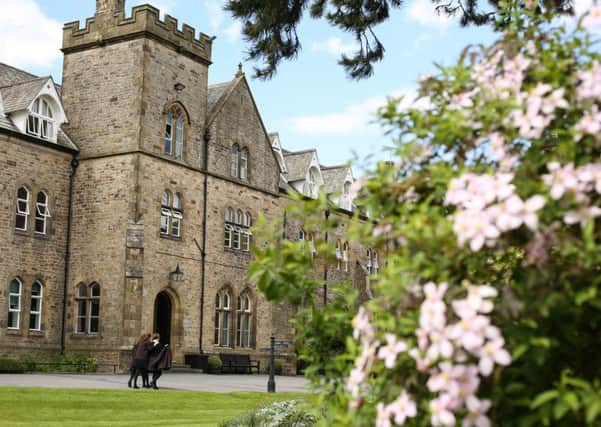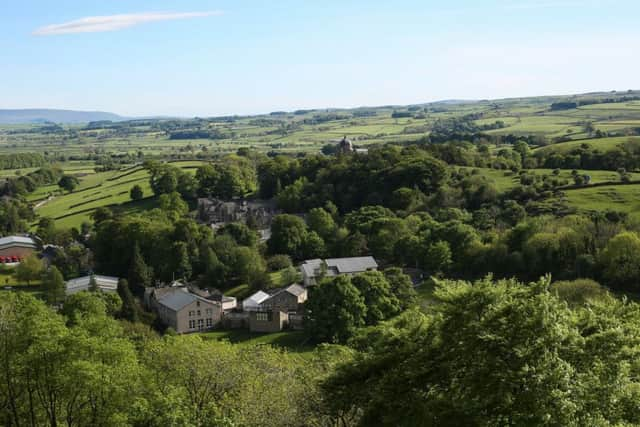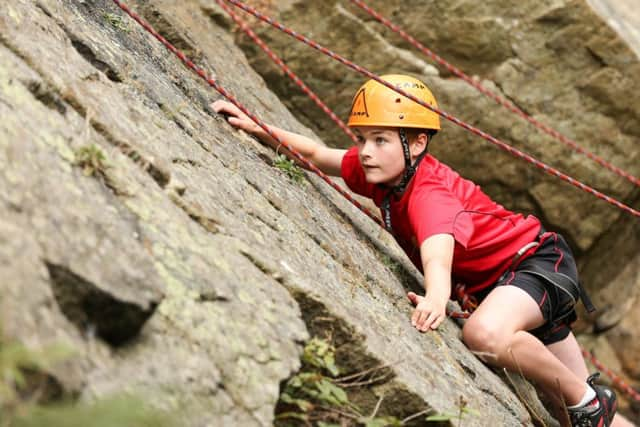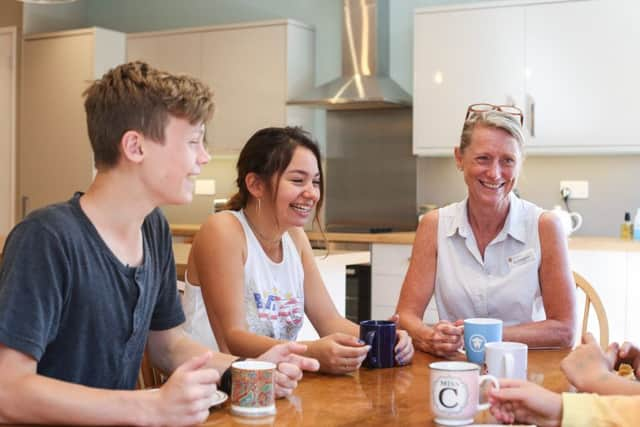Learning curve at Giggleswick School


At the height of my long and happy Enid Blyton phase, I’d have given anything to be a pupil at St Clare’s or Malory Towers. I wanted to be Darrell Rivers. I longed for midnight feasts, adventures and independence.
No doubt young fans of Harry Potter feel the same way about Hogwarts but as a grown-up I had become opposed to the idea of sending a child to boarding school.
Advertisement
Hide AdAdvertisement
Hide AdThere were reasons. My sister won a place at a ballet school in the late 1970s and she boarded there. Quiet but determined, she refused to kowtow to the queen bee bully and became her prime target.


Then I had my own children and couldn’t conceive of sending them away to be looked after by strangers, of not being there when they were ill or upset, of not seeing them for weeks on end.
So spending the best part of a day at Giggleswick School, chatting to staff and pupils, checking out the facilities, people watching and getting a feel for the atmosphere, was a revelation. Boarding has changed and so have my negative views on it.
I was invited to see the first stage of a multi-million pound makeover for the school’s boarding houses, which include open-plan living spaces, a kitchen, social and study areas and newly revamped bedrooms.
Advertisement
Hide AdAdvertisement
Hide AdNowell House is the first to be refreshed. Also in the planning is a new-build upper sixth form house designed to provide facilities for more independent living and working so that students are prepared for university.


“Boarding must adapt to modern demands,” says headteacher Mark Turnbull, who is in charge at the school founded in 1512.
It’s an enviable place to live, work and study thanks to a glorious position in the Dales village it was named after. The rural setting and the views are no doubt a selling point for parents, although the biggest incentives to pay boarding fees that range from £7,850 to £11,250 per term are the facilities and the small class sizes.
The 450 pupils – boys and girls – with a mix of 60 per cent boarders and 40 per cent day pupils, have a high rate of exam success. Another big draw is that Giggleswick has a staggeringly wide range of clubs and activities with a strong emphasis on the arts. There are 80 clubs and activities to choose from, ranging from kayaking and yoga to kit car building, astronomy and music lessons from rock groups.
Advertisement
Hide AdAdvertisement
Hide AdCompared to a state school, the facilities are exceptional. There are huge sports fields, a swimming pool, mountain bike trail and not just an art room but a whole art building.


“We aren’t posh and while our results are very good we are not ruthlessly academic to the exclusion of all else,” says Mr Turnbull, adding that the school also works with a charity to give places to children in danger of going into care.
He firmly believes that to make the most of the school you need to board but it doesn’t have to be seven days a week. Flexi-boarding enables pupils to board when it suits them and their parents.
“One of the biggest benefits is that boarding builds independence and the clubs and activities we have build skills. It can also help build positive relationships at home,” says Mr Turnbull.
Advertisement
Hide AdAdvertisement
Hide AdBoarders rise at 7.30am for breakfast and registration is at 8am with a morning of lessons and an afternoon of games and creative and performing arts; 4.45pm to 6pm is prep – homework with the added benefit of teachers around to help – then it’s clubs, activities and independent study. School also runs on a Saturday with lessons in the morning and something active like climbing, or cycling in the afternoon.
“The key is that you are active and you have the opportunity to push yourself to the edge of your comfort zone,” says Mr Turnbull, who points out that the profile of parents who send their children to boarding school is changing to include a growing number of busy entrepreneurs. They join those who are in the Forces and who choose boarding school rather than constantly uprooting their children as they move to different bases.
Old Giggleswickians, whose families have boarded for generations are also in evidence, as are farming, business and the professional classes, along with a small contingent of international pupils. Most parents live within a 90-minute drive and separation is eased thanks to mobile phones, though use is limited. “One of the issues with phones is that they create a dependency on parents and so children don’t learn to deal with the ups and downs of life,” says Mr Turnbull, who tells me that the days of dumping your child at the school gates and picking them up a couple of months later are also gone.
The children here certainly appear relaxed and happy, and they are very polite. I get a no-holds-barred account of life as a boarder from Hettie, 12, and Will, 13, who also give me a thorough tour of their “home”, a house for nine to 13-year olds overseen by Christine Gemmell, the house parent.
Advertisement
Hide AdAdvertisement
Hide AdBoth are from Forces families. Will had been to 10 primary schools and Hettie had been to six before they came to Giggleswick. Both found making friends easy and are pleased to be settled with no threat of moving. “I was shocked when my my parents first mentioned boarding but it’s fun,” says Will. “You have to be organised though. Matron gets you up but then you organise yourself.” This is, he says, made easier thanks to Mrs Gemmell, who writes the routine on boards and a screen. Bedtime is in a shared dorm at 9pm with lights out at 9.30pm.
Most children want to share a dorm, according to Mr Turnbull, who says it teaches tolerance of others and better emotional intelligence. As the children get older they can can choose to have a double or single room.
“Sharing a bedroom was odd at first because you don’t have privacy but you get used to it,” says Will, who has also got used to putting his laundry in the washing basket each day and picking up the dorm’s “bundle” of fresh clothes, all name-tagged.
Both children like the activities on Tuesday and Thursday before tea and there’s a choice, including cooking, mindfulness and wellbeing and crafts. Will likes training in the gym while Hettie enjoys mountain biking and the quiz.
Advertisement
Hide AdAdvertisement
Hide AdWhat do they miss most? Will misses his parents making him his favourite meals, chatting with them and “watching stuff on TV”, but he adds that he can chat to the house mistress and going home now feels more special. Hettie misses going home every night and “chilling” but says she never rings her parents because she’s too busy. “There’s too much going on,” she says.
Over in Nowell House and the teenage boys are hanging out in the smart new kitchen, the pool room and the TV rooms. The house master is James Bellis, a father of two grown-up sons with a good sense of humour, which is helpful as a “surrogate dad to 40 boys”.
He went to boarding school in the 1970s and has taught in the sector for years. “There’s a move away from big dorms set out in stalls and communal showers which were intimidating and there are no initiation ceremonies. Parents are also very involved. The days when they waved you off in September and picked you up in December are gone. They call us to discuss issues their child might be having and we encourage that.”
Wellbeing is monitored by staff and a mentor system. “The boys really take care of each other. These days they are more aware of being kind and the feedback system is strong. They’ll tell me if they think anything is wrong with another pupil and if there’s bullying, the senior boys know and are at my door.” Mr Turnbull adds: “In a class of 30 you might not notice if a child has an issue but in our small classes you pick up on it very quickly.”
Advertisement
Hide AdAdvertisement
Hide AdIt’s all very encouraging but would I send my children to boarding school? Probably not although I can now see why some parents do. Would my children, now 21, have wanted to flexi-board at a school like Giggleswick? I think it’s very possible.